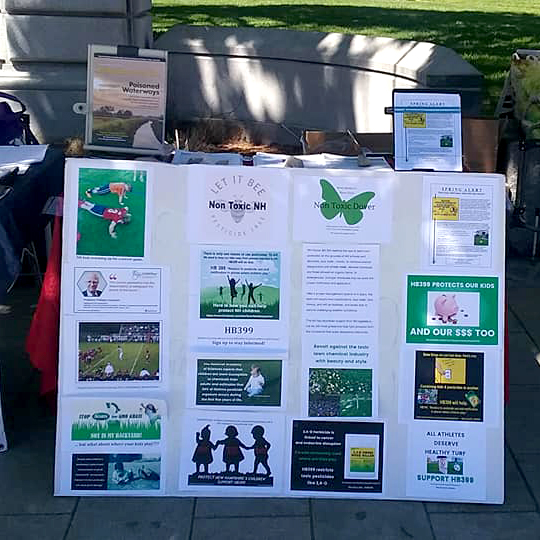Today was the 5th annual March Against Monsanto event in Concord. Thanks to organizers Fawn Gaudette and Carline Carpenter. Thanks, too, to the speakers: Beekeeper Amy Antonucci; NH State Rep Jim McConnell; NH State Rep. Mindi Messner; Dr. Marty Mitchner, Ph.D. Ecologist; and Laura Wolfer, a molecular biologist. Thanks are also due to the supporters, including Sierra Club, NH Rebellion, and NH Peace Action. Thanks to my husband, who gave up overtime to be there for me. And, finally, thanks to the rest of those who came to learn, listen, and then march through Downtown Concord.
 At the NH Right to Know GMO table at March Against Monsanto
At the NH Right to Know GMO table at March Against Monsanto
In addition to the other speakers, I was asked to provide an update on what has happened regarding the labeling of genetic engineered foods, and what is next. The following is from my notes about what I intended to say.
 Speaking
Speaking
Last year, Congress introduced S. 764, which we called the DARK Act – because it will Deny Americans the Right to Know. S.764 was passed, and is now known as “Public Law 114-216, the “National Bioengineered Food Disclosure Standard.” This law charges the USDA to define GMOs, and come up with a rule for labeling within two years.
While we had pushed to label GENETIC ENGINEERED foods — the process — Congress would like the labels to reflect the RESULT of that process. If a food has detectable levels of GMOs (genetically modified organisms), it would qualify as GMO, and would be labeled. However, foods that are highly processed, such as high-fructose corn syrup and sugar beets, and therefore have no detectable DNA, would be allowed to be called “Non-GMO.” This is rather outrageous, as many of us want to avoid genetically engineered foods for two reasons: 1. No long-term safety studies have been done, and 2. GE foods have more chemicals than traditionally grown foods, and much more than organic foods. (One of the most used chemicals is Roundup/glyphosate, which was identified as a probable human carcinogen by the World Health Organization’s cancer specialist team, IARC (International Agency for Research on Cancer).
The labels that Congress is recommending are a website, a bar code or a QR code. Imagine trying to look that up in a store with a screaming toddler in your arms … if you are lucky enough to have a smart phone, AND have Internet connection in the store. This sounds like socio-economic discrimination to me, right?
The other key factor in the “National Bioengineered Food Disclosure Standard” is that it forbids (pre-empts) states from passing their own labeling law. The labeling law that Vermont enacted on July 1, and the labeling bills that Connecticut and Maine had passed (but not yet enacted), were no longer legal.
We don’t know what will happen in the two years, or what will happen if the USDA fails to fulfill its charge within that time frame. With the current state of chaos in DC, it is anyone’s guess.
A few other noteworthy events over the last year:
- CRISPR – New generation of genetically engineered foods.
- EPA officials have helped Monsanto hide the dangers of Roundup
- As part of the budget deal passed this month, the FDA was given $3 million to promote the “environmental, nutritional, food safety, economic and humanitarian impacts” of GMOs. (Our tax dollars will be used to advertise products that already receive subsidies?!?)
- Recently, a shipment of imported soy magically became “organic” (so buy local as much as possible.)
But there is also SOME good news:
- In California, six counties where most of the organic crops in the US come from, now ban the growing of genetically engineered foods
- Oregon, where more of our organic food comes from, is working on a similar law
- California won a lower court argument when the Judge ruled that Roundup must comply with Proposition 65, and label this product with “WARNING: This product contains chemicals known to the State of California to cause cancer and birth defects or other reproductive harm.”
Because of the “National Bioengineered Food Disclosure Standard,” NH cannot pass a mandatory labeling law. California is successful in passing bans on GE crops, because they have a large percentage of the country’s organic crops, and a different political climate) than we do in NH. I’ve sounded out some of our key players in the NH Legislature, and find no support for a growing ban in NH. If that were to happen, I believe it would have to happen on the federal level.
Is that possible? I don’t see it happening in the near future. Yet, when I mention this to people, I hear “If Europe can ban, why not US?” It comes down to numbers:
The USA produces 40.3% of the world’s supply of genetically engineered crops. Brazil is responsible for 23.3% and Argentina for 13.4%. The rest of world grows 23% of all crops.
Spain is responsible for 90% of the GE crops in Europe. But they only grow .06% of the entire world’s production … compared to our 40.3%.
Europe was more cautious at the beginning.
We screwed up a long time ago.
It would be hard to go back, and impossible with the current political climate.
But, we need to keep pushing!
Keep pushing companies to label.
Kellogg’s was printing on cereal boxes “Produced with genetic engineering” a year ago, but are no longer. We need to keep putting pressure on these companies, and continue to boycott them.
Since we can’t work on labeling, or a ban here in NH, Rep. Jim McConnell, who was a co-sponsor of our last GMO labeling bill, approached me and asked if my team might have another bill we would like to introduce. We considered, and decided against a bill that would ban glyphosate — if that chemical is removed from use, what would be the substitute, and could it be more dangerous than Roundup?
Working with Beyond Pesticides, we came up with the language for a bill based on laws that have already passed in Connecticut and New York. “HB399: AN ACT relative to pesticide use and notification in places where children play” will restrict the use of the lawn care chemicals used in school grounds, daycares, playgrounds and athletic fields to those allowed on organic properties. (To satisfy the golf industry, an amendment has been introduced to clarify that golf courses are not considered athletic fields, and thus would be exempt from this bill.)
Initially, it will cost more to get the condition of the lawns/fields stable, but, one established after two to three years, it will require less maintenance, fewer chemicals, and less water … ultimately resulting in less cost.
HB399 has bipartisan support, with four Republican Reps, four Democratic Reps, and one Dem Senator.
The hearing before the NH House Environment and Agriculture Committee was well attended. There were many supporters, but the pesticide industry was very visible. Several lawn-care companies, who use dangerous chemicals, were opposed to the bill. One of the key voices was RISE, (“Responsible Industry for a Sound Environment”), a lobbyist group out of Washington DC. Rep. Catherine Sofitikis of Nashua asked a key question: Who do you represent? They are the national trade association representing manufacturers, formulators, industry leaders involved with pesticides. Who are their members? The DC RISE lobbyist reluctantly admitted that it was companies like Monsanto, Dupont, Pioneer … Gotcha!
There are a lot of steps left! HB399 was retained in Committee. A subcommittee will study the pros and cons of the bill over the summer. The subcommittee will vote on their recommendation to the full Environment and Agriculture Committee. That full committee will vote on the subcommittee’s recommendation. (My best guestimate is that the Environment and Agriculture Committee will vote in September, and the full House will vote on it this fall. If it fails the House vote, it is done. If it is approved by the House, there will be a Senate committee hearing, a committee vote, and a full Senate vote before it can go to the governor for signing.
Will NH legislators consider the environment, and especially the health and safety of NH’s children … or will they support the pesticide industry? Time will tell.
Non Toxic New Hampshire is the grassroots group that was formed to support HB399. If you would like to help protect our children and grandchildren, please follow the facebook group, Non Toxic New Hampshire, https://www.facebook.com/NonToxicNewHampshire, or contact me directly. We will let you know when we need to contact our Reps to encourage them to vote the right way.
 Table for Non Toxic New Hampshire.
Table for Non Toxic New Hampshire.
Photo credits: Fawn Gaudette.
